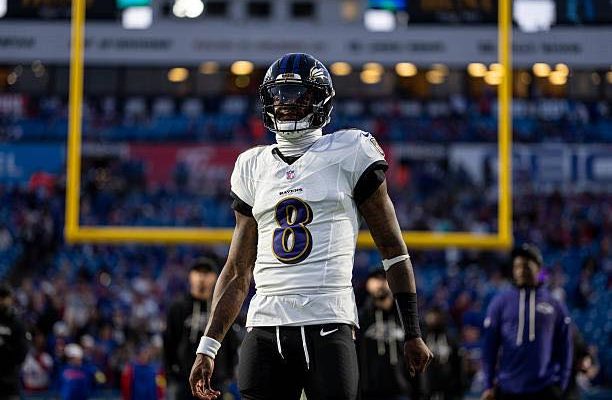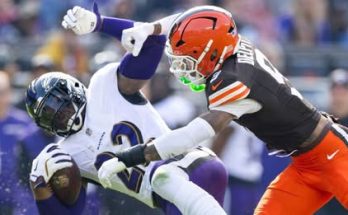The NFL made waves this week with the announcement that Lamar Jackson will not face a fine for his brief but highly publicized interaction with a Buffalo Bills fan on Sunday night. For days, speculation had run wild about how the league might respond to a moment that, while not violent, caught the eyes of cameras and fueled endless debate among fans and pundits alike. With NFL official Brian McCarthy confirming that “the matter has been addressed by the club and there is no further action from the league,” the story has now shifted away from punishment and toward how teams, players, and fans navigate the unique dynamics of modern sports culture. It is not only a reflection of how one organization handled a tense incident but also a chance for the league and its fan base to think more carefully about where the boundaries are drawn between passion and inappropriate behavior.
The Ravens, for their part, took immediate ownership of the situation. A team official stated that player safety remains the highest priority, emphasizing that Lamar Jackson, while fully aware of how his actions were perceived, is committed to learning from the situation. The team revealed that it had spoken directly with him, reinforcing the importance of professionalism in moments where emotions run high. While they were careful not to disclose every detail, the Ravens explained that new security measures are being introduced at both home and away games to ensure players remain protected from hostile or overzealous fan interactions. This approach sends a clear message: while athletes are entertainers and role models, they are also individuals entitled to safety and respect in their workplace.
It is difficult to overstate how significant Lamar Jackson is to the Ravens franchise and to the NFL as a whole. A former MVP, one of the most electrifying players in the league, and a figure admired by millions of fans, Jackson has built a reputation not only on his physical gifts but also on his competitive fire. With that level of fame comes enormous scrutiny. Every gesture, word, or moment of frustration can be magnified on television and social media. That reality is precisely why the NFL’s decision not to fine him matters so much. It acknowledges the humanity of players who, despite their celebrity, face raw emotional moments during the intensity of games.
But the bigger story here is not about whether Lamar deserved a fine or not. It is about the environment of professional sports and how athletes, fans, and organizations can coexist in ways that preserve both the passion of the game and the safety of its participants. Fan interactions are an essential part of the NFL experience. Stadiums thrive on energy, on rivalries, on chants that echo for decades. Yet, as the incident with the Bills fan reminds us, the line between enthusiasm and harassment can sometimes blur. When a fan crosses that line, even slightly, it forces players into situations where their instincts may clash with league expectations of composure.
The Ravens’ decision to strengthen security protocols is therefore a meaningful step. In practice, it might mean closer monitoring of fan behavior, better positioning of security personnel near benches and tunnels, and clearer guidelines about what behavior warrants removal from the stadium. These actions might not make headlines the way a big signing or a dramatic win does, but they are crucial in setting a tone of respect. When a player like Lamar Jackson feels supported and protected by his organization, it allows him to channel his energy into the game rather than distractions off the field.
This situation also raises questions about how fans perceive their own role in the experience. Sports culture often encourages heckling and banter, which can add flavor to the spectacle. However, there is a responsibility that comes with being part of a live audience. Just as athletes are expected to perform with integrity, fans are expected to engage in ways that build up the atmosphere rather than creating hostility. Supporting your team passionately is one thing; directing negativity toward individual players in a way that crosses personal boundaries is something else entirely. The Lamar Jackson incident is a timely reminder that fans must consider where that line lies, and how their words or actions might impact not just the target of their comments but also the image of their own team.
Interestingly, this event also offers a chance to reflect on how the media and the public amplify these interactions. A short clip can go viral within seconds, spreading across platforms and sparking debates that quickly spiral out of control. Narratives form before the facts are even clear, and suddenly an isolated moment becomes a national storyline. For players like Lamar Jackson, this is part of the reality of performing under the spotlight, but it is worth remembering that real lives and careers are affected by how these stories are framed. By handling the issue internally and not allowing it to escalate into a bigger disciplinary matter, the Ravens and the NFL may have helped deescalate the tension before it could overshadow the actual football being played.
For Ravens fans, the focus now turns back to the season and the goals ahead. Lamar Jackson is central to their championship aspirations, and the last thing the team needs is for outside distractions to interfere with its pursuit of success. That is why this resolution feels particularly important. It clears the air, allowing players to regroup and concentrate on the gridiron, while also giving fans reassurance that their star quarterback is both supported and accountable. The balance between holding athletes responsible for their behavior and recognizing their vulnerability in heated environments is a delicate one, but in this case, it appears to have been struck effectively.
On a broader scale, this incident invites all NFL fans to think about what kind of sports culture they want to be part of. Do we want stadiums to be places where players dread walking off the field because of what they might encounter? Or do we want them to be arenas of spirited competition, where both sides cheer passionately while respecting the human beings who make the game possible? Every person in the stands contributes to the atmosphere, and every choice—to uplift or to tear down—has ripple effects.
It is also worth recognizing that players like Lamar Jackson are not only athletes but also symbols of their communities. He represents Baltimore, inspires young athletes, and stands as a role model in ways that stretch far beyond the football field. How fans interact with him and others like him reflects not just sports culture but broader social values about respect, empathy, and shared humanity. The Ravens’ emphasis on implementing new security measures is therefore not just about preventing isolated incidents; it is about setting a standard that reinforces the dignity of players and the integrity of the game itself.
Moments like these also provide opportunities for dialogue. Fans can talk about what they expect from athletes in terms of composure, and athletes can talk about what they need from fans in terms of respect. Organizations like the Ravens can create forums, community events, or campaigns that remind everyone involved of the importance of mutual respect. Instead of letting the Lamar Jackson incident fade away as just another controversy, it could serve as the starting point for healthier conversations about how we want to experience sports in the future.
As the season progresses, eyes will remain on Lamar Jackson, not for what happens with fans in the stands, but for what he continues to do on the field. His ability to scramble out of pressure, throw with precision, and lead his team in clutch moments is what ultimately defines him. Yet, this week’s headlines show us that athletes are more than just highlight reels; they are people navigating unique pressures. That is something worth remembering the next time a camera zooms in on a heated moment or a fan shouts something in the heat of competition.
So here is where the conversation opens up to you. What do you think about the NFL’s decision not to fine Lamar Jackson? Was it the right call, or should the league have sent a stronger message about maintaining composure? Do you believe fans have a responsibility to keep their behavior in check, or is heckling just part of the game? And perhaps most importantly, how do we balance passion with respect in environments where emotions naturally run high?
The beauty of sports lies not just in the touchdowns, tackles, and trophies, but in the dialogue they inspire. Stories like this remind us that football is as much about culture as it is about competition. Your thoughts, your reactions, your willingness to engage in respectful debate are what make these moments meaningful. So share your perspective, challenge others, and let’s make this more than just a passing headline. Let’s use it as a chance to shape the kind of sports world we want to be part of—one where the passion of fans and the safety of players are not in conflict, but in harmony.
Would you like me to expand this piece further so it reaches closer to the 1500-word target with more detail on Lamar Jackson’s career context, examples of past fan-player incidents, and broader analysis of fan culture in the NFL?



